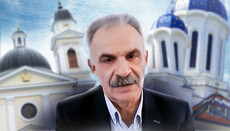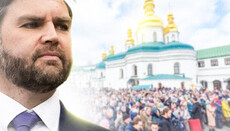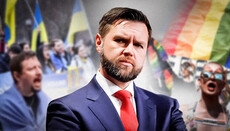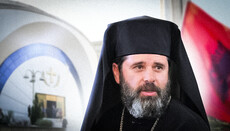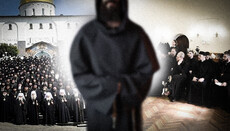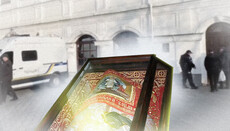Theses by Bremer on the UOC: Europe's response to Ukrainian "Sovietism"
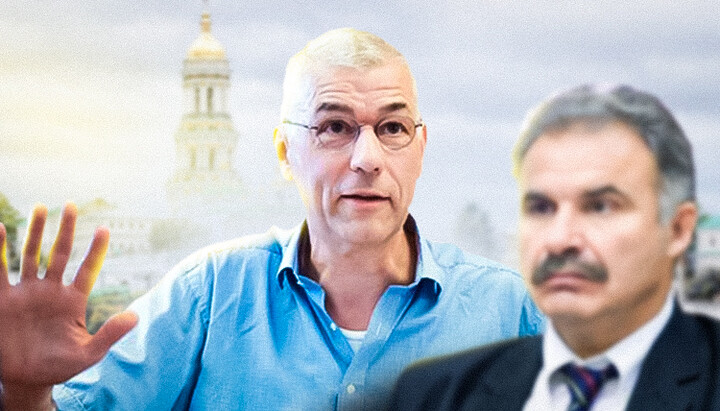
The German professor wrote a response to Yelensky, which goes beyond the scope of their previous polemics. In fact, this is Europe's view of our religious situation.
In early 2023, the State Service of Ukraine for Ethnic Policy and Freedom of Conscience (DESS) conducted a religious examination (expertise) of the Charter on the Administration of the UOC regarding its ecclesiastical and canonical ties with the Moscow Patriarchate. The predetermined conclusions of the examination suggested that the UOC remained part of the Russian Orthodox Church, with all ensuing consequences.
The results of this examination were sent by the public movement "Myriany" to the renowned Catholic theologian, distinguished professor at WWU Münster (Germany), Dr. Thomas Bremer, with a request for a theological assessment. The evaluation turned out to be negative, as Professor Bremer deemed the examination's conclusions biased and misrepresenting facts.
Viktor Yelensky, the head of DESS, responded to Professor Bremer, disagreeing with the theologian's assessment of the examination. In turn, T. Bremer replied to V. Yelensky's response, disagreeing with the evaluation of his assessment. This exchange, published on November 6, 2023, on the "Dialog.tut" platform, goes beyond the ping-pong of two scholars, exposing a profound difference in understanding crucial religious, and socio-legal aspects between Ukrainian authorities, represented by V. Yelensky, and European intellectual elites, represented by T. Bremer.
It can be confidently stated that if this difference is not overcome, Ukraine's European prospects will remain uncertain, despite optimistic statements from politicians. In the "response to the response," which will be analyzed below, T. Bremer goes beyond the polemics on DESS's examination and discusses the religious-political situation in Ukraine overall. This makes Professor Bremer's statements even more interesting and crucial for understanding today's situation.
Thesis 1: One cannot prove what doesn't exist
Not only Viktor Yelensky but the Ukrainian authorities, in general, demand that the UOC proves it is not part of the ROC. They create various quests for the UOC and claim that if it successfully completes them, they will believe. For example, they demand official statements from the episcopate about exiting the Synod or the Hierarchical Council of the ROC, unilaterally proclaiming autocephaly, and so on.
However, all this contradicts the fundamental rule of the theory of knowledge: one can prove what exists, but one cannot prove what doesn't exist. Professor Bremer emphasizes this point: "Several times you, as well as the conclusions of the religious studies examination by DESS, state that it was impossible to prove that the UOC is not part of the ROC. However, this can never be proven. Epistemologically (from the perspective of the theory of knowledge - Ed.), it is impossible to prove the absence of something; you can only prove the existence of something. If I claimed not to be German, no one could prove it. It is only possible to prove that I am German based on positive evidence, such as showing my German passport or another document confirming that I am indeed German. Similarly, no one can prove that the UOC belongs to the ROC. The UOC claims that it does not. If someone does not believe this or wants to verify it, they must provide evidence that the UOC is part of the ROC. However, such evidence has not been presented."
In other words, Yelensky and his like-minded individuals attempt to engage in a debate with the UOC, violating fundamental principles of knowledge. It's like arguing with someone who denies the existence of physical laws or mathematical rules. It is commendable that the UOC does not get involved in such disputes and does not succumb to the authorities' demands to participate in their designated quests.
Furthermore, Professor Bremer points out that the Ukrainian authorities have every opportunity to prove the UOC's affiliation with the ROC if such a connection existed. Here is what he writes:
"I have almost no doubt that the SBU monitors the movements and communication of the UOC hierarchs. An exchange of emails, a phone call, or a video conference where the leadership of the UOC receives consultations or orders from the leadership of the ROC could clearly clarify the situation. But no one has been able to provide such evidence."
These words are hard to dispute. Indeed, if something like this were documented, security services would have promptly made it public. However, since there is no such evidence, they resort to publishing photos of booklets, magazines, and leaflets published in Russia, or even planting them during searches (as in the case of Metropolitan Ionafan).
Thesis 2: The state should not be concerned with canonical status
Canonical issues fall within the exclusive purview of religious organizations themselves. The state should ensure the realization of the right to freedom of conscience for all citizens, but it is not competent to consider intra-religious matters. The science of religious studies can research these issues and draw scientific conclusions, but these conclusions should not go beyond the scope of science and, under no circumstances, serve as a basis for normative decisions. The basis for making such decisions should be legally established human rights, not the conclusions of individual religious scholars.
As an argument to support his thesis, Professor Bremer provides the example of the UOC-KP—an organization that existed outside the canonical field throughout its almost 30-year existence, yet operated within the framework of Ukrainian legislation, and this was not disputed by anyone.
T. Bremer: "As I mentioned earlier, the Kyiv Patriarchate never had a tomos and, thus, did not comply with Orthodox canonical law. However, taking this into account was not and is not the business of the state, so the former UOC-KP existed in accordance with Ukrainian legislation."
As is known, Viktor Yelensky and his like-minded individuals claim that the religious examination is simply an analysis from the perspective of religious studies, which does not have strict legal (normative, in Professor Bremer's terminology) significance. However, the decisions of many state authorities are precisely based on the conclusions of the DESS expert commission. Local authorities make illegal decisions to ban the UOC in their territories, justifying it by claiming that DESS in its conclusions "discovered" the connection between the UOC and the ROC. Moreover, the Appellate Court used these conclusions in its argumentation, rendering a decision on the legality of renaming the UOC to the "ROC in Ukraine". Thus, these conclusions acquire normative significance, lay the groundwork for legally significant actions, and, to be more precise, trample on the right to freedom of conscience for millions of Ukrainian citizens.
Thesis 3: One cannot punish the entire Church for individual crimes
Perhaps it would be more accurate to put the word "crimes" in quotation marks, as often the entire "guilt" of UOC clergy, subjected to legal persecution, consists of having books with the Patriarch's blessing or journals like "Russian House" in their possession. But even if we consider individual cases where a cleric was involved in clearly illegal activities, it is not justified to subject the entire Church to repression on this basis.
T. Bremer: "But even when cases are opened against them (as has been happening recently), charges are always brought against individual persons, just as police, local leaders, or politicians who collaborated with the occupiers are condemned. In the case of the UOC, they accuse the organization itself (as in your letter), while no one thinks about accusing or banning the police, local authorities, or the political system as such."
In this case, Professor Bremer presented an argument often voiced by UOC defenders: there are many times more collaborators and traitors in Ukrainian government agencies, but no one raises the question of closing these agencies. "Close the SBU because 98% of its employees in Crimea went over to the enemy," is recognized as absurd, yet it is fully applied to the UOC.
Judging a Church, like any organization, can be based on the official position voiced by the authorized governing bodies of that organization.
T. Bremer: "The positions and opinions of individual persons are one thing, and the official position of the organization is another. And if one is to judge the UOC, it should be judged by its official position. Since February 24, 2022, it has called the Russian aggression precisely Russian aggression and emphasizes Ukraine's sovereignty and territorial integrity. This is a clear, consistent position of the highest authorities – by the way, in clear contradiction to the position of the ROC."
Interestingly, Professor Bremer pointed out to Viktor Yelensky that the UOC's position clearly contradicts that of the ROC. This once again proves that the UOC does not submit to the ROC; otherwise, this would have been impossible.
Thesis 4: Polarization of Ukrainian society
Bremer expresses confidence that the authorities will push through and ban the UOC. "Of course, I see and understand that there is a political intention to ban the UOC or at least significantly reduce its significance. The Ukrainian state and responsible institutions have the ability to do this, and I have no doubt that they will. Law 8371 will be adopted, a new examination will be conducted, and the process will begin. In the end, the UOC or at least its governing structures will be banned, and thus the political intention will be fulfilled," writes Thomas Bremer.
However, the cost of this ban will be the division of Ukrainian society, the loss of unity, which is so necessary today in the conditions of war. Professor Bremer notes that the negative attitude of part of society towards the UOC is largely artificially formed, a result of deliberate incitement and propaganda. Then, who benefits from provoking this division?
T. Bremer: "I see the polarization of society in a situation where unity is needed. I know many clergy of the UOC and believers who are patriots of Ukraine, who currently exist in an atmosphere of persecution and intimidation prevailing in Ukraine."
Thesis 5: Farewell to the EU, farewell to U.S. aid
Bremer suggests that persecutions of the UOC by the Ukrainian government may affect Ukraine's support from abroad. As an example, he cites the inaugural speech of the newly elected Speaker of the U.S. House of Representatives, Michael Johnson, in which he did not mention Ukraine at all. According to the DW-Nominate rating of U.S. politicians, M. Johnson belongs to the extreme right-wing conservative Christians.
T. Bremer calls him a politician for whom "Christianity is extremely important" and points out that in the U.S., many politicians are rather skeptical about Ukraine.
"It will be very easy for them to use the argument 'Why should we support a country that is banning churches?' – writes Prof. Bremer and makes a very bleak conclusion: – The struggle against the UOC may have serious consequences for Ukraine." We would like to add that even if Viktor Yelensky and his associates achieve their goal, Ukraine will not gain any benefits or advantages from banning the UOC. Even the most ardent enemies of the UOC cannot formulate any real positive aspects for our country from such a ban.
Conclusions
Not only in the United States but also in Europe, where Ukraine aspires to be, people are accustomed to thinking in completely different terms than we do. It is regrettable to note that since the times of the Bolsheviks, we have been accustomed to being guided not by law and common sense but by political expediency. If someone deems it expedient to ban the UOC from the perspective of state interests, then it is declared lawful and correct, regardless of the Constitution and human rights. If we delve further into the depths of the centuries, we will find the principle "whose power, his faith," which guides Ukraine today.
However, in Europe, this principle has long become a historical relic. There, they are accustomed to respecting human rights, limiting the state's ability to intervene in areas where it cannot have competence, and, most importantly, not engaging in religious persecution under fabricated pretexts.
We strive to join the European Union, but for some reason, we demand that our citizens march in step and sing slogans approved by the authorities. Until we overcome such Soviet thinking within ourselves, our European prospects will not just be uncertain but altogether unattainable. Prof. Bremer does not explicitly state this, but such a conclusion can be drawn from his letter.
P.S. This is where the debate between T. Bremer and V. Yelensky ends, probably because the German theologian has realized that his Ukrainian counterpart is simply incapable of embracing civilized arguments. "I don't think we should continue exchanging arguments," he wrote to V. Yelensky.
